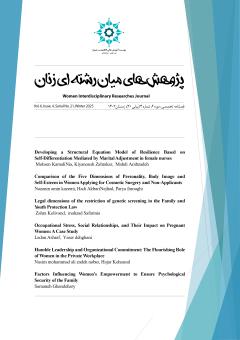Factors Influencing Women's Empowerment to Ensure Psychological Security of the Family
Subject Areas :
1 - Master's Student, Department of Quranic Interpretation and Sciences, Qom Seminary, Qom, Iran.
Keywords: Women's Empowerment, Empowerment, Family Empowerment, Psychological Security, Family.,
Abstract :
Women, as one of the main pillars of the family, play a crucial role in maintaining the integrity and boundaries of the household. Since the family, as the fundamental social unit, has a direct impact on the growth or decline of societies, attention to its empowerment is essential. To prevent the destructive consequences of social collapse, strengthening and empowering the family in individual, familial, social, and international dimensions is of paramount importance. In this regard, governmental organizations must design programs to empower social structures and enhance international capabilities, taking political considerations into account.Conversely, contemporary feminist movements, especially on a global scale, emphasize that women do not need to depend on men and should receive education in all dimensions. This idea has been pursued in many countries, particularly in developing nations, in the form of women's empowerment programs. This study provides a comprehensive perspective on women's empowerment in cultural, economic, political, and social aspects, aiming to include all women, not just those who are heads of households.The present study was conducted using a qualitative approach and in-depth interviews. The results indicate that women's empowerment is influenced by two categories of factors: internal and external. Women themselves act as an internal factor, while spouses, parents, and cultural institutions are identified as external influential factors.
1- قرآن کریم
2- نهج البلاغه
3- ابن منظور، محمد بن مکرم(1408ه.ق). لسان العرب. بیروت: دارالحیاء التراث العربی.
4- اکبری مقدم، ناهید(1393). بررسی امنیت روانی در زنان و دختران بدحجاب باحجاب. اولین همایش ملی فرهنگ عفاف و حجاب. بندرگز.
5- آمدی، عبدالواحد بن محمد(1388). غرر الحکم ودرر الکلم. ترجمه لطیف راشدی و سعید راشدی. قم: پیام علمدار.
6- حکمی، نسترن؛ حکمی، نسرین؛ و صدری افشاری، غلام حسین(1377). فرهنگ فارسی امروز. تهران: انتشارات کلمه.
7- رسولی، هاشم(1358). تاریخ انبیاء. قم: تحقیقات و نشر معارف اهل بیت.
8- رضازاده، فاطمه؛ رضازاده، احمد و رضازاده، سیما(1394). همکاران مروری بر توانمندسازی. سلامت و اشتغال زنان سرپرست خانوار. کنفرانس بینالمللی پژوهشهای نوین در مدیریت و مهندسی صنایع.
9- رضائیان، علی(1382). مبانی مدیریت رفتار سازمانی. تهران: نشر سمت.
10- رضوانی، علی اصغر(1385). پیامبر اعظم و حقوق زنان. قم: نشر مسجد جمکران.
11- صدوق، الامالی(1362).کتاب امالی شیخ صدوق. ترجمه محمدباقر کمرهای. تهران: کتابفروشی اسلامیه.
12- صفوی، عیسی؛ ضمیران، بهار؛ معارفوند، معصومه؛ و عرشی، ملیحه(2015). توانمندسازی اقتصادی دختران و زنان جوان درکشورهای آفریقایی. آمریکای لاتین و حوزه دریای کارائیب. فصلنامه علمی پژوهشی مددکاری اجتماعی، 3(4)، 3-12.
13- طباطبایی، محمدحسین(1360). المیزان فی تفسیر القرآن. قم: منشورات جامعه مدرسین حوزه علمیه.
14- عمید، حسن(1390). فرهنگ فارسی عمید، تهران: امیر کبیر.
15- کلینی رازی، محمدبن یعقوب(1360). اصول کافی. ترجمه سید جواد مصطفوی. تهران: دفتر نشر فرهنگ اهل بیت .
16- مجلسی، محمدباقر(1397). بحارالانوار. تهران: کتابفروشی اسلامیه.
17- محمدی ری شهری، محمد(1363). میزان الحکمه. قم: دفتر تبلیغات اسلامی.
18- مطهری، مرتضی(1368). امامت و رهبری. قم: نشر صدرا.
19- معین، محمد(1391). فرهنگ فارسی معین. تهران: امیر کبیر.
20- مکارم شیرازی، ناصر(1374). تفسیر نمونه. تهران: دارالکتاب الاسلامیه.
21- مهر آیین، محمد حسین(1389). همت و کار، قم: سایا.
22- مهرابی، امیر حمزه(1393). توانمندسازی منابع انسانی در نظام ارزشی اسلام. قم: پژوهشگاه حوزه و دانشگاه.
23- نوروزی، فریبا(1395). تبیین نظریههای راهگشا در ترسیم مدل علی توانمندسازی زنان با تأکید بر توانمندسازیاقتصادی. کنفرانسبینالمللینخبگانمدیریت.


